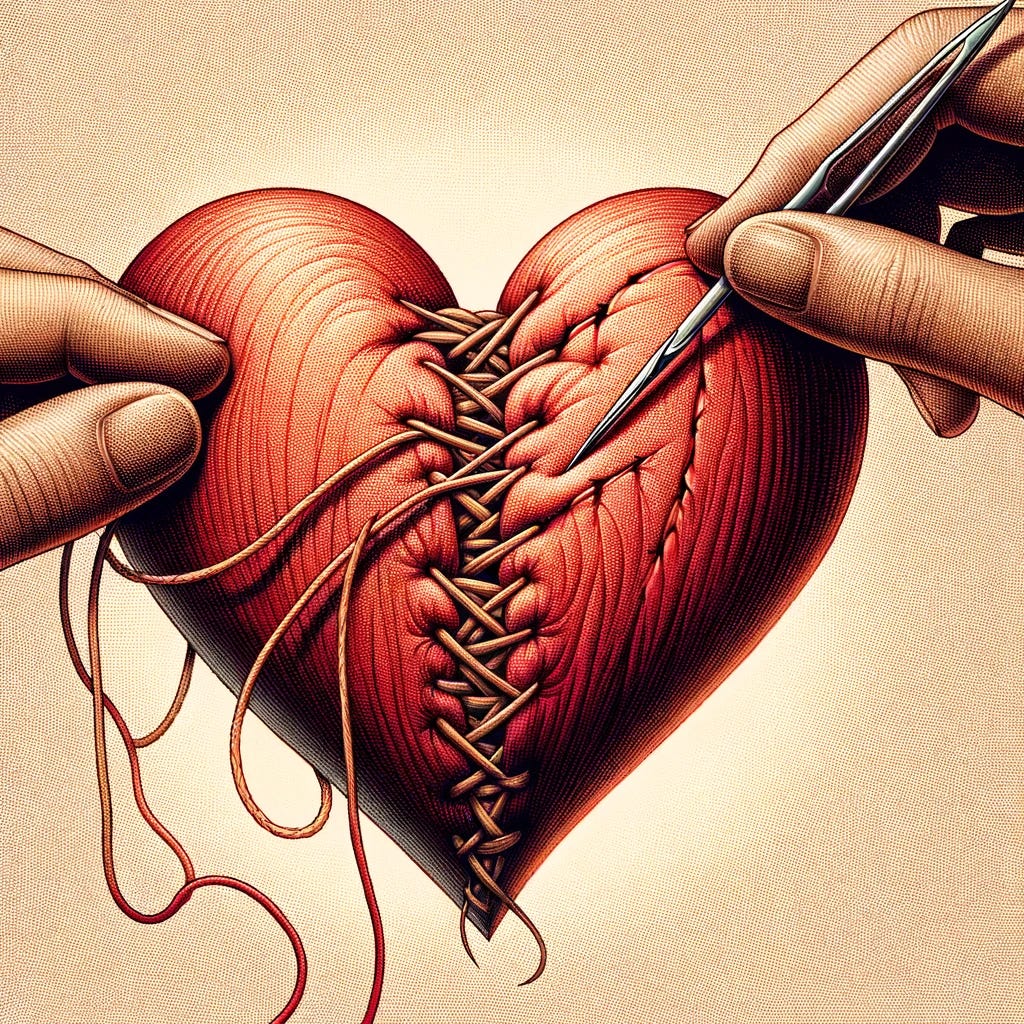Our Tragic Optimism
How we can hold onto hope and meaning during our darkest times
Each month, we tackle a different theme on how to live what the ancient philosophers called the “good life”—a life in the pursuit of becoming the best version of oneself.
For the month of March, we’ve been focusing on the theme of suffering and its role in everyday existence. You can find links to the series at the bottom of this article.
This Week at a Glance:
This week we dive into the topic of hope during some of our darkest times. Hope can be a hard thing to hold onto when we’re in pain or suffering. Viktor Frankl, however, provides a solution.
By the time you finish this meditation, you’ll learn:
🍭 What tragic optimism is and how it can be applied during times of suffering;
🍬 The difference between happiness and meaning;
🍫 The importance of reframing our current experiences to see how they play a part in the greater whole.
“Step by step we had to become accustomed to a terrible and immense horror.”
Viktor Frankl
Man’s Search for Meaning
Man’s Search for Meaning, Viktor Frankl’s memoir on his survival of the Holocaust, is perhaps one of the most important books of all time. Held within the pages are not only stories of suffering and emotion of what it took to survive some of the harshest conditions ever placed upon humans, it showcased the resiliency of a man to find meaning in the bleakest of places.
After Frankl’s survival of the Holocaust, he would go on to create a form of psychotherapy known as logotherapy which centered around an individual finding meaning within their existence.
Built into this therapy is what Frankl has coined “tragic optimism”—
“In brief it means that one is, and remains, optimistic in spite of the “tragic triad,”… a triad which consists of those aspects of human existence which may be circumscribed by: (1) pain; (2) guilt; and (3) death.”1
At the heart of tragic optimism is a simple question that we all, in one shape or another, reflect upon during our lifetimes:
“Can life retain its potential meaning in spite of its tragic aspects?”
“Life is a gift.”
“To be alive is fortunate.”
“Imagine all those who have it worse off.”
“Things will turn around—things will get better.”
These are all phrases people tell us when we’re going through hard times. And they are said as a way to help us, to remind us there is hope, there is still light.
But from our perspective, when we’re in the throes of it, we’re not looking for or even getting a glimpse of any light, we’re just looking for the closest thing to grab onto to help us survive, to ride out the wave we’re battling.
Tragic optimism is our ability to go through suffering while maintaining hope, buoyed by the meaning we have inscribed to our life. Suffering is inescapable, it will eventually find us all.
Tragic optimism pushes us to stay resilient when it arrives.
“With tragic optimism, if a situation doesn't unfold as badly as you thought, you'll be pleasantly surprised. If a situation does unfold as badly as you thought, you'll be prepared and levelheaded.”2
According to Frankl, what matters most is that we work to be our best, regardless of what the world throws our way.
“…an optimism in the face of tragedy and in view of human potential which at its best allows for: (1) turning suffering into a human achievement and accomplishment; (2) deriving from guilt the opportunity to change oneself for the better; and (3) deriving from life’s transitoriness an incentive to take responsible action.”3
The problem here is many of us conflate the idea of meaning with happiness. Many people can be happy and still feel they lack purpose in the world. The key, according to Frankl, is for one to stop searching for happiness and instead start search for meaning.
“Happiness cannot be pursued; it must ensue. One must have a reason to “be happy.” Once reason is found, however, one becomes happy automatically…a human being is not one in pursuit of happiness but rather in search of a reason to become happy...”4
Frankl uses the analogy of laughter to illustrate his point. If we were to tell someone to laugh, they can’t (well, they can but it’s not a genuine laugh). In order to really get someone to laugh, we need to “give them a reason,” such as telling a joke. The laugh then ensues.
In order to live a life we’re happy with, we must find meaning within it. And to Frankl, the meaning a person prescribes can be life or death.
But meaning does not necessarily need to be solving cancer or saving the world. It can simply be doing your job to the best of your ability for a cause greater than your own.
In 1962, then president John F. Kennedy visited NASA as they built their space program and raced against the clock to put a man on the moon before the Russians could. During the tour, Kennedy ran into one of the custodians. When Kennedy asked what he did within NASA, the custodian replied, “helping put a man on the moon.”5
We often get the most meaning out of life not for what we do for ourselves but for what we do for a greater cause. This is where our tragic optimism lives.
We all want to feel important, we want to feel like we’re making a difference, but not everyone can be the best. Not everyone can be president, or lead researcher, or even teacher of the year. And so our tragic optimism is to openly accept Frankl’s three layers of suffering: pain, guilt, and death. These things make us human, but they also remind us that by adjusting our perspective, by looking beyond the self, we can actually find meaning in the work we do, and in the process, find happiness too.
More importantly, we cannot have meaning without having hope. It is through the meaning we place on events that hope blossoms. Hope is the ability to understand what the world looks like, flaws and all, and still maintain a vision for what a better world could be.
While it may not always seem like hope is possible, it is important to keep in mind that just because we’re suffering doesn’t mean we’re broken, it actually means we’re alive and living life. We may not be where we want to be, we may not feel how we want to feel, but it is part of our individual journey.
A better way to look at the suffering we experience as we search for meaning in the world is to remind ourselves that we’re a work in progress, every day bringing with it something new to learn and experience.
And while that may not always be pleasant, while it can’t always be rainbows and sunshine, it is a reminder that life is about our slow awakening to its experiences, and in the process, stitching ourselves together to embrace another day of it.
As the poet
so astutely points out:“Everything we learn, we learn from someone who is imperfect. We all come into the world less than done, unfinished, our skulls still stitching themselves together. All wax and feathers, a mess of hope.”6
Life is suffering and there is unfortunately no escaping that. We can attempt to numb the pain of it or try and hide from it but it ultimately always finds a way to you. So the question to ask is not how can I avoid this suffering, rather it should be, how can I learn to suffer while maintaining hope? How can I learn to suffer decently?
The good life does not consist in the clothes we wear or the cars we drive, it does not care about how much money we have in the bank account or the the house we live in. The good life cares about the journey we take to find meaning in our existence, and through that, our ability to handle the suffering the world throws at us.
As Frankl wrote:
“Once an individual’s search for a meaning is successful, it not only renders him happy but also gives him the capability to cope with suffering.”7
3-Bullet Summary:
Tragic Optimism is one of Viktor Frankl’s principles within his psychotherapy framework known as logotherapy that helps individuals find a way to maintain hope during times of suffering.
Even when dealing with pain, guilt, and death, tragic optimism can help in transforming suffering to strength and maintain hope.
True happiness in life is a byproduct of finding our meaning in the world and pursing that.
Thank you for reading this week’s meditation. It’s through sharing that Mind Candy spreads.
Hit the ❤️ and button below to share some candy.
For the month of March, we’ve been focusing on the theme of suffering through our Monday Meditations (MM), Wednesday Wisdoms (WW), and Friday Sweet Bites (SB).
Here are the topics covered so far if you wish to catch up:
Please consider supporting independent writing and upgrade to a paid membership (it’s less than a cup of coffee per week, and sweeter).
Until next week,
D.A. DiGerolamo
We are a participant in the Amazon Services LLC Associates Program, an affiliate advertising program designed to provide a means for sites to earn advertising fees by advertising and linking to Amazon.com.
Viktor Frankl, Man’s Search for Meaning
Brad Stuhlberg, Master of Change
Viktor Frankl, Man’s Search for Meaning
Paul Bloom, The Sweet Spot
Maggie Smith, You Could Make This Place Beautiful
Viktor Frankl, Man’s Search for Meaning









